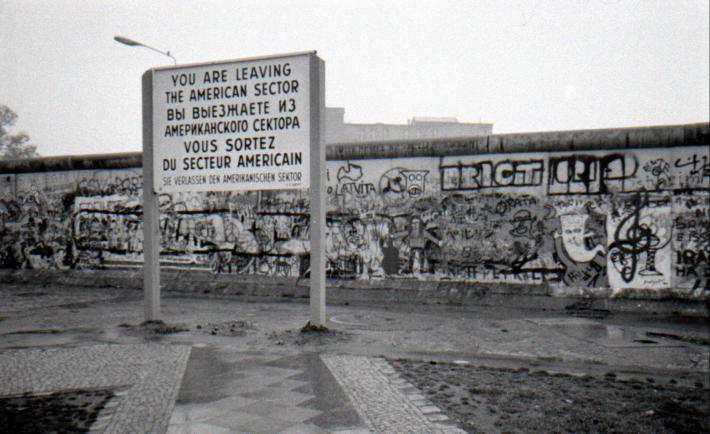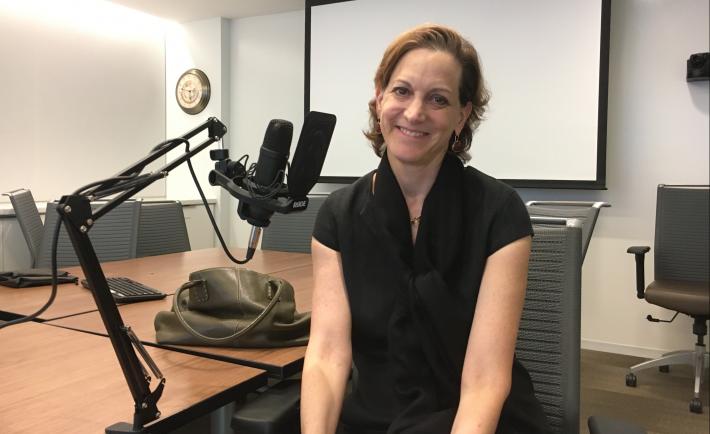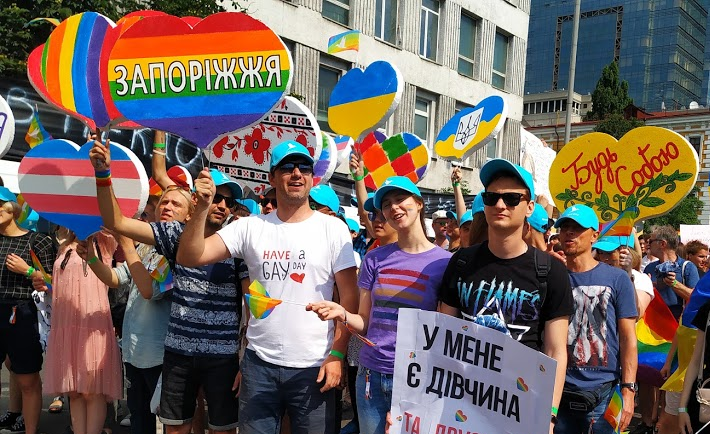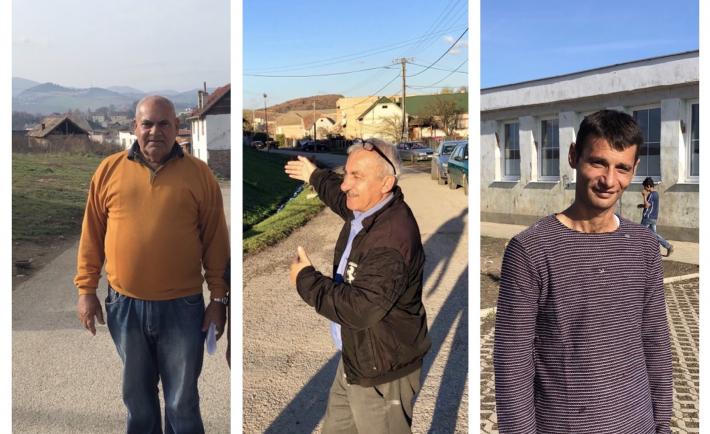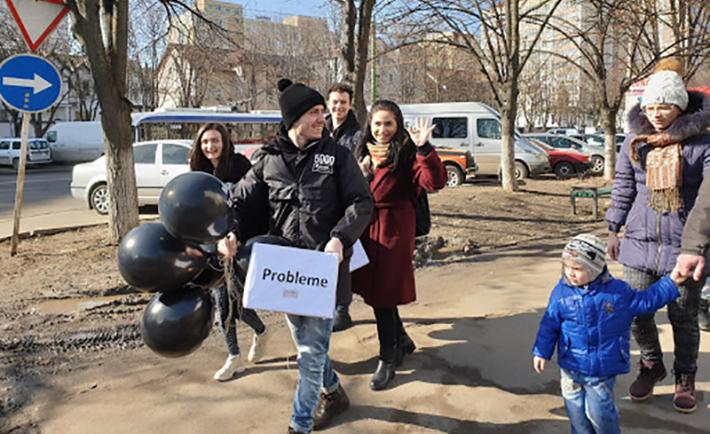Recorded just blocks from the Brandenburg Gate, NDI’s Robert Benjamin continues his discussion with Zuzana Papazoski about the fall of the Berlin wall and its effect on modern society. With so many questions surrounding democracy, are the lessons learned in the 1990’s still relevant?
See something, say something, do something!
How has Europe changed since the Iron Curtain lifted?
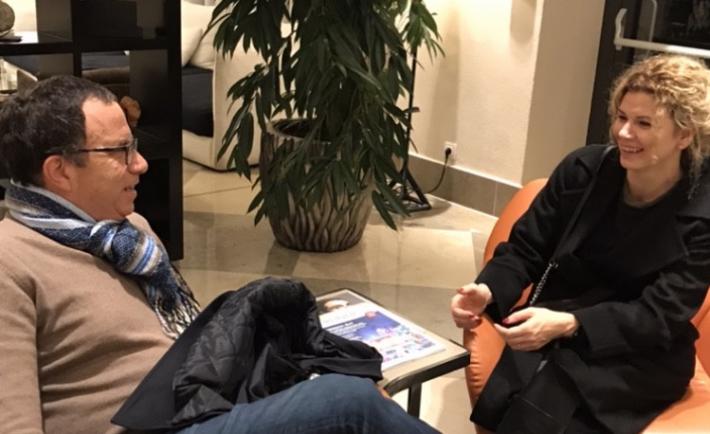
Left to right: Robert Benjamin, Senior Associate and Regional Director for Central and Eastern Europe Programs, and Zuzana Papazoski, Resident Director for Czech Repulic, Slovakia, and Poland
In our second Demworks episode recorded in Berlin, NDI’s director for Central and Eastern Europe, Rob Benjamin talks to Zuzana Papazoski, who currently runs NDI’s programs in Poland, Slovakia, and the Czech Republic. Three decades after the Iron Curtain was lifted, they discuss the dramatic revolutions and democratic change that swept across Europe. How were they driven in great part by young people?
30 years since the Berlin Wall fell, progress for democracy continues
Madeleine K. Albright visits the crumbled remains of the Berlin Wall to mark the 30th anniversary of its fall.
Last week marked the 30th anniversary of the fall of the Berlin Wall. Amid the remembrances, debates over "what went wrong" and doubt about democracy's promise in some quarters almost seemed to overshadow the celebrations.
Reflecting on the fall of the Berlin Wall, 30 years on (w/ Brian Atwood & Ken Wollack)

Left to right: Former NDI President Brian Atwood, Current NDI President Derek Mitchell, Former NDI President Kenneth Wollack
In this special episode of Demworks, NDI President Derek Mitchell is joined by his predecessors at NDI, Brian Atwood and Ken Wollack. The three discuss the years before and after November 9, 1989, the day the Berlin Wall fell. Together on this anniversary, they take stock, talking about the evolution of NDI’s work around this period, discussing the specific cases that helped shape the Institute, and reflecting on lessons learned given the state of democracy today.
Is Democracy in Europe Delivering?
Next month marks the 30th anniversary of the fall of the Berlin Wall. Democracy looked much different in 1989 than it does today. How has democracy changed in Eastern Europe since the bold steps it took in the region three decades ago?
In this Demworks podcast, NDI President Derek Mitchell sits down with Pulitzer-prize winning journalist, analyst, professor, and historian, Anne Applebaum to discuss the current state of democracy in Eastern Europe, and what its future looks like. #Listen to this engaging #podcast as they discuss the importance of citizen participation and political awareness in democracies today.
The good news about Ukraine – and why it deserves our support.
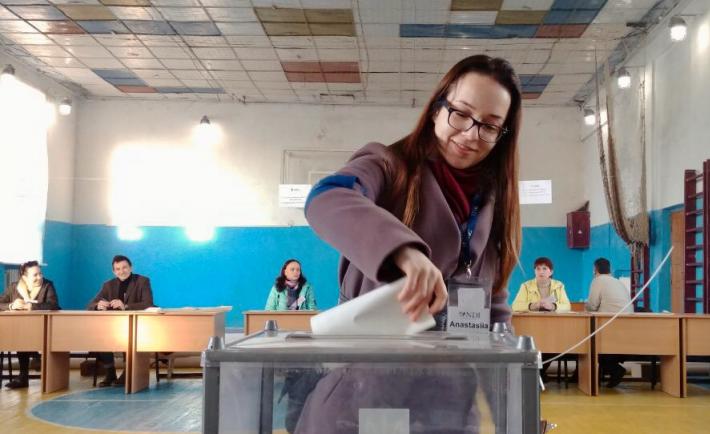
An NDI staff member votes in the March 31, 2019, presidential election, while accompanying international election observers as they observed opening, voting, counting, and tabulation processes in Kyiv and 13 other regions across the country.
Ukraine is all over the news these days, albeit not in a good way. That is unfortunate. The country deserves much more – and favorable – support for its democratic progress and remarkable resilience in the face of economic hardship and unrelenting Russian aggression. Five years after the Revolution of Dignity ushered in a new democratic moment in 2014, Ukraine’s people in fact are as unified as ever in their aspirations for a more democratic, peaceful and corruption-free society.
What did the European Parliament elections reveal in Central Europe?

As four days of voting for the 2019 European Parliament (EP) elections closed on May 26, crowds await results from the European Union’s 28 member states and the new composition of the EP for the next five years. CC-BY-4.0: © European Union 2019 – Source: EP
The European parliamentary elections, held in May, came at a time of political soul-searching for the countries of Central Europe – the so-called Visegrad group of the Czech Republic, Hungary, Poland, and Slovakia – as they wrestle with European integration, constitutional democracy, and national identity. Though closely tied, the four countries are responding in different ways.
NDI Partner Organizes Ukraine’s Largest Pride March
On June 23, NDI partner KyivPride joined other LGBTI groups in organizing the largest Pride march ever in Ukraine, gathering about 8,000 participants from across the country. The event marks a substantial step forward for Ukraine’s lesbian, gay, bisexual, transgender, and intersex communities, which remain largely marginalized in social and political life. The event took place during the active parliamentary election campaign and against a backdrop of targeted far-right activism that has resonated with only a small subsection of the Ukrainian public.
One Person Can Make a Difference: Success Stories of Roma Advocacy in Slovakia
The Roma, whose numbers are estimated at more than 10 million, make up Europe’s largest minority group, and are also the largest socially and economically-marginalized population. Across the continent, Roma face systemic discrimination in employment, education, healthcare and housing. This leads to poor quality of life, lower life spans, higher school delinquency rates and higher unemployment rates in comparison to their fellow non-Roma citizens. According to official EU statistics, anywhere from 33 to 58 percent of Roma children will experience segregation in public schools and, on average, only 12 percent of Roma between the ages of 18 and 24 will have completed high school.
Being the Change: Moldovan Youth and the 2019 Parliamentary Election
“What is the local issue most important to you?”
“What is the national issue most important to you?”
“What qualities are you looking for in your member of parliament?”

